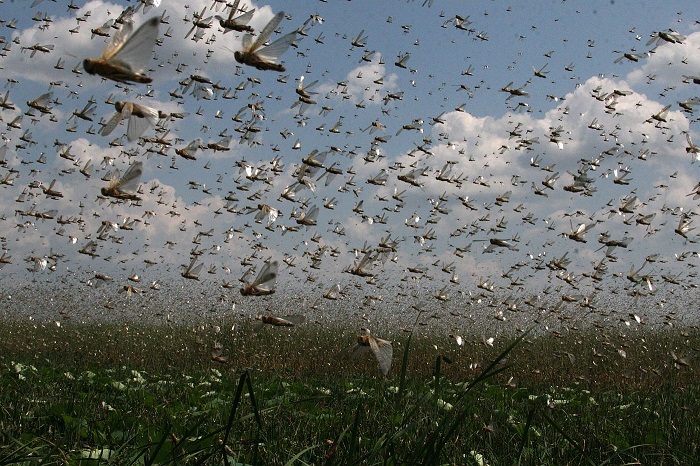nCa Report
Uzbekistan and Kazakhstan are under direct threat of the locust invasion and the rest of Central Asia should not consider itself safe.
Here is a report published by Daryo.uz on 10 June 2024:
Cost of ignorance: Uzbekistan risks massive losses amid locust invasion
Facing a looming locust invasion, Uzbekistan is on high alert, particularly in the Romitan district near Gazli, along the A-380 “Bukhara-Khorazm” highway. Locusts and grasshoppers pose a significant threat to agriculture in Uzbekistan and Central Asia. Three species, including the Moroccan, Italian, and Migratory locusts, are particularly worrisome.
“Unfortunately, the forecasts are coming out right. If the government and local authorities continue to ignore scientists, including climatologists, such impending disasters may bring great losses to Uzbekistan. We need to start listening to the scientists,” wrote Rasul Kusherbayev, Former deputy of the Legislative Chamber of Oliy Majlis.
As of April 2024, Moroccan Locust hatching and development were noted across all Caucasus and Central Asia (CCA) countries, the Food and Agriculture Organization of the United Nations reports. Italian Locust hatching was observed in southern Kazakhstan by late April, while Migratory Locust hatching occurred in Russia’s Krasnodar region. CCA countries treated 335,094 hectares since the start of the 2024 campaign, a 17% increase from the same period in 2023.
If not controlled, locusts can damage over 25 mn hectares of pastures and crops, directly affecting more than 20 mn people. These insects can fly up to 100 km per day and damage various crops and plants common in Central Asia.
Agriculture ministers from five Central Asian countries recently met to discuss sustainable locust management. The meeting aimed to enhance cross-border cooperation and share knowledge, experience, and lessons learned to improve locust management and reduce related risks.
The link to this report: https://daryo.uz/en/2024/06/10/cost-of-ignorance-uzbekistan-risks-massive-losses-amid-locust-invasion
* * *
The FAO reported on 10 June 2024 that the agriculture ministers of Central Asia had jointly discussed sustainable locust management.
Central Asia’s agriculture ministers jointly discussed sustainable locust management
On 7 June, agriculture ministers from the five Central Asian countries came together at a virtual meeting to discuss sustainable locust management at the national and regional levels.
The meeting was hosted by Kazakhstan and facilitated by the Food and Agriculture Organization of the United Nations (FAO). The goal was to strengthen cross-border and long-term regional cooperation and to share experience, knowledge and lessons learned from locust campaigns.
The meeting covered advanced approaches to improving country capacities and supporting a preventive approach for better locust management and the reduction of risks related to locust outbreaks. This includes the use of monitoring systems, in particular the Geographic Information System developed by FAO, as well as more efficient and safer locust control, such as the Ultra-Low Volume (ULV) technology for locust spraying and use of biopesticides.
At this occasion, countries’ representatives acknowledged the positive impact on regional cooperation, capacity strengthening and introduction of best practices and new tools of the FAO “Programme to improve national and regional locust management in Caucasus and Central Asia (CCA)”, with the support provided by the Japan International Cooperation Agency (JICA) and the United States Agency for International Development (USAID).
They called for even more cooperation and for the active introduction and use of modern methods and technologies towards sustainable locust management. Reducing the impacts of locust control on food security and livelihoods while limiting the risks to human health and the environment are key to ensuring better production and a better environment.
The FAO has also conducted the bilateral cross-border surveys between the locust control agencies of the region. The several reports covering the outcomes including the training and awareness measures can be found at this link: https://www.fao.org/locusts-cca/news/en/c/1683205/
* * *
We hope the steps taken by the regional countries suffice to ward off the massive locust invasion that is almost imminent. /// nCa, 26 June 2024
